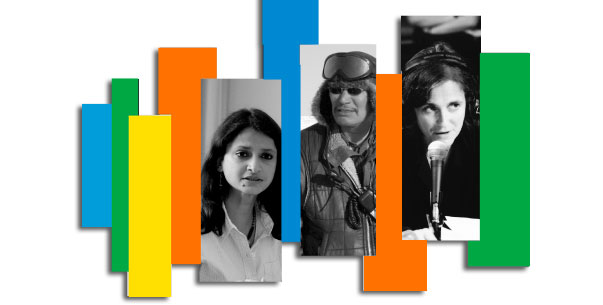|
|
ways of seeing
Profiles of three visionaries who are paving a path toward a better future: Anuradha Mittal, Amy Goodman & Zacharias Kunuk.

If there was ever a time when a new vision of the world was necessary, now might be it. Open eyes see the widening gap between rich and poor, a natural system on the brink of collapse, and a continuing degradation of human rights through perpetual wars, muffling voices of dissension and a refusal to hear those affected directly by government policies. The path toward a better world is paved by those who can see through the chaos and act on the inspiration nurtured by our ability to respond to change and open to grace. Thinking outside the box and seeing what connects us to our world and each other is the providence of a visionary. ascent is honoured to profile three visionaries, in the fields of media, human rights and film, who through their creativity and service offer us new ways to see.
Anuradha Mittal: changing the system from within
by daniel goldsmith
“When we talk about globalization, it’s not enough to put a Band-Aid on the situation and make it a little kinder or gentler,” explains Anuradha Mittal, founder of the Oakland Institute, an influential progressive American think tank. A native of India, she is an expert on many areas that affect social, economic and political policy arenas. Over the past three years, she has created a comprehensive progressive agenda that concretely affects national and international debate on issues ranging from genetic engineering, to foreign aid to free trade agreements.
“I was motivated to establish the Oakland Institute after I realized the growing influence of conservative think tanks,” she explains. “These organizations now exert huge influence on foreign and economic policy that affects people around the world.”
broadcaster Amy Goodman speaks up for those who are rarely heard
by anurag dhir
On the day I began writing this in early March, Amy Goodman ended Democracy Now!’s daily one-hour broadcast by speaking on the phone to Navy veteran and peace activist Wally Cuddleford from Tacoma, Washington. He and one hundred other protesters were involved in an act of civil disobedience, attempting to prevent the US military from shipping three hundred Stryker armoured vehicles to Iraq from the Port of Tacoma.
Asked if the protests were being given any local media coverage, Cuddleford confirmed there was, although he added that much of it was “strange.” “A lot of the news coverage has been like ‘Unidentified protester arrested,’” Cuddleford recalled, “even though I gave my name five times.”
Giving a voice and a name to those who are rarely heard in the mainstream US media has been an integral part of Democracy Now!’s mandate since the show first aired on Pacifica Radio in 1996. “That’s our goal,” says Democracy Now! creator Goodman, speaking to me on the phone from her home in New York City. “To provide a forum for people to speak for themselves, and when they can’t, to tell their stories until they can.”
Zacharias Kunuk translates Inuit oral tradition & mythology to film
by jay bulckaert
In 1981, when Zacharias Kunuk was twenty-four years old, he traded some soapstone carvings for a video camera. For his whole life, he had watched his father and friends return from hunting trips and tell the story of the hunt. “What I wanted to do,” Kunuk says, “was go hunting with my father and videotape it and at the end of the day, he’s drinking tea with his hunting buddies. I wanted to see it and show it.”
This was the beginning of his own practice of capturing Inuit culture, stories and beliefs. From hunting films, Kunuk went on to produce television dramas, co-founded Isuma, an Igloolik-based production company, and in 2001 released the first Inuit feature film, Atanarjuat: The Fast Runner.
Atanarjuat and his most recent project, The Journals of Knud Rasmussen, won major awards at Cannes and the Toronto International Film Festival, and received acclaim from critics around the world. However, Kunuk is not making films to win the accolades of the film world – he is doing this to tell the stories of the 4,000-year history of his people. “We’re filming for an Inuit audience,” he says. “If it passes them, then anyone can judge it.”
Kunuk finds that the oral tradition of his culture translates naturally into the medium of film. The wisdom of elders provides his team with intimate knowledge of Inuit traditions and shamanism, both of which his films are centred on. “All the elders that have been living on the land are still living today in modern communities. They still know [the stories. My generation] is next in line, we’re going to be elders next. We want to know these stories.”
Daniel Goldsmith is a Montréal-based writer and photographer. His first book, Choose Your Metaphor, will be published later this year.
Anurag Dhir is a writer and filmmaker living in Montréal.
Jay Bulckaert is a filmmaker, writer and vagabond randomly wandering the world from the high arctic to South Asia and anywhere in between.
|

